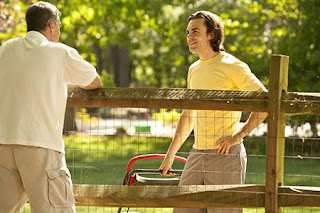The Engaged Neighbor Principles Need Your Online Pledge
I grew up in a small Missouri town during the 1970s and 1980s where the doorbell ringing was greeted with excitement. We were always excited to have unexpected neighbors drop by for a visit. It was a regular occurrence and it was common for neighbors or visitors to stay a couple of hours visiting.
By the mid-2000s, when my children were younger, we were more likely to freeze in place if the doorbell ever rang. Or ignore it all together, assuming it was just a package being delivered.
A half-century ago, neighbors would have been the most obvious choice for forming social connections in a town. In the 1950s, 44 percent of neighbors socialized with each other at least once a week, according to Melody Warnick in her book, “This is Where you Belong.”
Neighborhood cocktail parties, poker games, picnics and potlucks dominated a person’s social life. By 1971, that number had fallen to only 24 percent and continued declining. In our own survey we just asked about annual get-togethers, not weekly, and that came in at 18%.
In the current American culture, chronic stress and busyness have squashed the desire to interact with our neighbors, and other social norms have made it more difficult.
Marc Dunkleman in his book “The Vanishing Neighbor,” points out that in the wake of World War II, “being neighborly meant reaching out to the people who lived next door – taking a homemade cake to the family moving into the house across the street, offering to watch the kids in a pinch, saying hello at the block party, or inviting acquaintances to join a Wednesday night bowling league. Over the years, however, the term came to denote almost exactly the opposite. Today neighborly means leaving those around you in peace!”
Neighboring begins by learning and using names, it grows through associations, and ultimately it bears fruit with engaged neighbors who can positively impact their neighborhood and community. This definition works for subdivisions, farms and apartment buildings!
Neighbors are those who live in closest proximity to you. Sometimes this is defined as the people living behind the eight closest front doors to you, the eight adjoining lots or apartments.
Why such a narrow definition?
Important to have a goal for neighbors beyond just picking people you like. Neighbors could be more than the eight around you but it should never be less.
Why do people not engage with their immediate neighbors? Research and theories of why we no longer engaged can be grouped into a few broad categories: loneliness, seeing our homes as a retreat, abundant indoor entertainment, busyness, fear of the physical social messes in the neighbors home or life, shame about the physical and social mess in our own family, and selfishness about our time.
Based on the available research and books on the topic of neighboring these are the common reasons Americans have for not reaching out and forming relationships with their immediate neighbors.
In true American fashion, we blame this change on smaller front porches, frequent moves, privacy fences, air conditioning that keeps us indoors, indoor entertainment, both parents were out of the home, investing time in social media instead, the believe that social media is just as good, too much time in front of windshields (love commutes) and televisions.
There are strong reasons for becoming an engaged neighbor. Some of those arguments focus on the value of an engaged neighbor for a community. Others will mention the connection between engaged neighbors and the civic health of a community. Here are a fell more ideas to consider: being engaged helps to offset impacts of the self-absorbed culture, engagement improves our place attachment, engagement can improve your quality of life and health, engagement in a neighborhood can reduce crime by 60 percent, being engaged provide s a community benefit, grows your own social capital, develops local leaders, prevents future problems with neighbors, can be fun, and for some people, loving their neighbor is a call.
Connect With Neighbors
- I will learn and use my neighbor's names.
- I will discard a lifestyle of busyness in favor of being present and available.
- I will share honestly about myself and family, our hurts and successes, with neighbors.
- I will learn the gifts and talents of my neighbors and the assets in my neighborhood.
Develop Trust
- I will listen first and talk second when visiting with my neighbors.
- I will remember local neighbor etiquette to help create a culture of trust.
- I will allow love, kindness, and mutual respect to motivate my actions.
- I will pursue reconciliation, offer forgiveness, and give my neighbors the benefit of the doubt when conflicts arise.
Serve Neighbors
- I will do more front yard living to be available for conversations and service.
- I will express gratitude for my neighbors by performing spontaneous kind deeds.
- I will include neighbors in my life who are overlooked, marginalized, disabled, widowed or lonely.
- I will practice hospitality toward and eat with my neighbors.
Grow In Knowledge & Skills
- I will celebrate neighboring holidays to build positive relationships.
- I will be a continual learner about neighboring and asset-based community development.
- I will not turn my neighbor into a “project” or gossip about my neighbors.
- I will invite neighbors into my daily routine with a plus-one approach to neighboring.
Find Mutual Benefit
- I will focus my energy on what is strong, not what is wrong in my neighborhood.
- I will invest my time and talent in a homeowners or neighborhood association.
- I will help to set neighborhood priorities and pursue the common good where I live.
- I will not be afraid to celebrate what it means to be an engaged neighbor.





Comments
Post a Comment